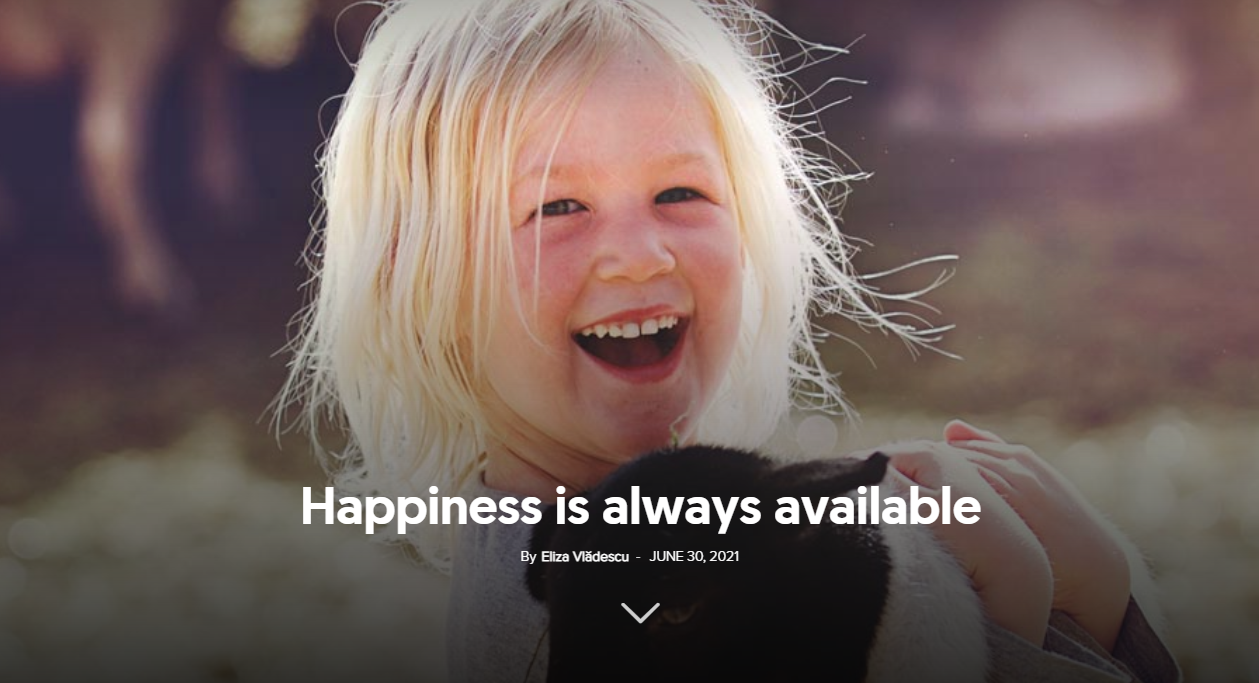She is an old age pensioner living across the street from my house. But I very rarely meet her. For years she has stayed in her house because of the many serious health problems she has been struggling with.
Her husband would always care for her, making sure she was as comfortable as she could be and receiving the treatment she needed. He was lean, fit, and strong. But now he is struggling with a particularly aggressive type of cancer.
To my surprise I met the old lady the other day. She was out collecting the mail, and so was I. And as we met by the rack of mailboxes, I struck up a conversation.
“Life is not easy at the moment,” I said, something mid-way between a statement and a question.
“No,” she responded. “Life has taken a turn for the worse, and now I am the stronger of the two of us.” She is not one for small talk, so she started to walk back to her house. Halfway across the street she had more to say.
Leaning on her crutch she turned towards me and said: “Even in the most difficult of times, my husband and I always find moments of joy.”
Her words had me thinking about the meaning of happiness and what makes people experience happiness.
For many, happiness is an elusive quality of life. It is like chasing the end of a rainbow; it is always somewhere else. Regardless of where they search or what they try, happiness does not seem to be within reach. Others, like my elderly neighbour, are able to experience joy and happiness even in life’s darkest chapters. How is this possible? What is the secret?
Happiness eludes definition
We will get to answering those questions in a minute. But let us first try out some definitions of happiness. This is not an easy task; even trying to define happiness is elusive since there is no standard definition of the term.
The first thing you probably think of when asked for a definition of happiness is that it is a feeling of joy or pleasure. That is certainly a feature of happiness, since it has everything to do with emotion. By saying that, we also acknowledge that happiness has very little to do with hard facts. There is no exact instrument with which we can measure happiness.
In a track and field competition we use a clock to measure how fast the sprinters run the 100-meter race. Usain Bolt’s world record of 9.58 set in Berlin in 2009 is the objective standard every other runner is working hard to beat. That world record time has nothing to do with feeling, even though a runner who is able to beat the record will experience a burst of joy and happiness. But even if the time measured in a 100-meter race is an undisputable and objective fact, the level of joy and satisfaction one athlete will experience after a race may be quite different to another athlete.
Next time you watch a track and field event, pay attention to how the athletes react after a race. I have seen an athlete very dissatisfied with coming in second with a time which, objectively speaking, is a fantastic time, while one who came in sixth is ecstatic because she set a personal best. What is objectively possible to measure is not necessarily an indication of happiness in this arena.
Wealth is another area where what is objectively measurable does not indicate the level of happiness. A lady with millions’ worth of assets may feel much less happy than a lady living in a humble hut but who feels joy, contentment and satisfaction because she is surrounded by loving family members and has the respect of the other people in her village. Money is not a reliable indicator of happiness.
These examples show us that happiness is closely linked to satisfaction. But there is no objective way of measuring life satisfaction; it is a subjective experience.
Happiness research
Despite the absence of an objective way to measure happiness, there is still considerable scientific research on happiness globally. In the 1970s Bhutan began talking about the concept of Gross National Happiness (GNH), recognizing that there were parameters other than the Gross Domestic Product (GDP) which could be used to measure their citizens’ quality of life. More and more people are realising the truth of the centuries-old wisdom that a happy life is not defined by an abundance of possessions (Luke 12:15).
Other countries also caught on to the idea of a Gross National Happiness measure, and since 2012 the United Nations has published the World Happiness Report.[1] The year 2022 marks the 10th anniversary of the report and the message of the report is threefold: the true measure of progress is the happiness of the people, happiness can be measured, and we know a lot about what causes it.[2]
In general, the world population experiences positive emotions more than twice as frequently as negative emotions. That is one of the findings of the World Happiness Report for 2022. Trust in public institutions is a key factor in happiness, says the report, which notes the results of the 2020 report where researchers “found that individuals with high social and institutional trust levels were happier than those living in less trusting and trustworthy environments.”[3]
One of the metrics used in the World Happiness Report is how often people engage in helping other people or donating to charities. During the years 2020 and 2021 marked by the Covid-19 pandemic, the percentage of people who helped a stranger rose by 6,8% and 13,5% respectively compared to the 2017-2019 baseline.[4]
The Happiness Research Institute, an independent think-tank based in Denmark, works to inform decision-makers of the causes and effects of human happiness. In 2021 The Nordic Council of Ministers commissioned the Happiness Research Institute to issue a report on human happiness titled Towards a Nordic Wellbeing Economy[5] to aid politicians as they work to improve the level of happiness and well-being among their citizens.
All the Nordic countries rank among the top ten in the World Happiness Report for 2022. Policy makers are obviously paying close attention to how legislation and public initiatives contribute to happiness in the population.
Research on happiness in populations at the national level has become so important that the Organization for Economic Co-operation and Development (OECD) has established a Framework for Measuring Wellbeing and Progress.[6]
Personal happiness
The national and global research on happiness shows us that many politicians are working to create societies where people experience happiness. Although politicians are doing their part to create societies where people are happy, we have a personal responsibility to live happy lives. What are the secrets to happiness?
The interesting fact is that happiness is not dependent on the physical conditions around us. It is much more dependent on how we view life itself—our attitude to life.
Some years ago, I spent a week in a small house right on the beach on the western coast of Zanzibar. Most of the locals were poor by European standards. But they were content. They did not have much, but they had what they needed. There were fish in the ocean and fruit on the trees. They lived happy lives. I believe it had to do with their attitude.
Gratefulness
Gratefulness is an attitude that helps you experience joy and happiness. If you tend to be ungrateful, there is a lot to gain by practicing being grateful. Take note of all the loving people in your life and the positive things you experience. Be conscious of those things you should be grateful for.

The Bible often links gratitude with happiness. Psalm 9 is one example: “I will give thanks to you, Lord, with all my heart; I will tell of all your wonderful deeds. I will be glad and rejoice in you; I will sing the praises of your name, O Most High” (Psalm 9:1-2).
Peace
You can make choices that lead to happiness or bitterness. If you continually find yourself in conflict with others, you need to find ways to live at peace with those around you whether they are family members, neighbours, or colleagues. A life of continual conflict will deny you experiencing true happiness.
Are you too focused on your own rights and needs? Do you have difficulties seeing other people’s perspectives? If so, this is a key area to work on. Your views and desires are not necessarily the right ones or the best ones, even if you have strong convictions.
Research has shown that stable relationships are extremely important to happiness. Let us take a closer look at why that is.
Relationships
The Harvard Study of Adult Development is probably the longest study of adult life that has been made throughout history. The original study began in 1938 with two groups of men. Recently the research embarked on a study of the second generation of the original cohort.[7] For more than 75 years researchers followed 724 men, asking questions about their health and happiness every other year. One group consisted of college students at Harvard; they finished college during World War II. The other was a group of boys from one of Boston’s most disadvantaged neighbourhoods. In 2016 Dr Robert Waldinger, the current director of the study, discussed the findings of the research in a TED talk.[8]
These teenagers developed into men who entered many different professions. They made life journeys in many different directions, some becoming successful in their chosen careers. One of them even became the president of the United States of America, John F. Kennedy. Others took a journey in the opposite direction and developed alcoholism and other problems.
One major finding from this study is that social relationships are highly beneficial and that loneliness kills. Those who connect to family, friends and community are happier, healthier, and live longer than those who do not have a good network of friends.
Those who have less contact with others than they want are less happy, their health is poorer, their brains decline sooner, and they live shorter lives than those who are not lonely. This is a significant insight, particularly in the light of the fact that loneliness is a prevalent issue in all corners of the world. Those seeking happiness must seek to build deep and lasting relationships.
Interestingly, according to Dr Waldinger, the study found that it wasn’t cholesterol levels or other health metrics in mid-life that determined how old these men would become. The most important factor was how satisfied they were in their relationships. Good and satisfying relationships translated into long life. Not only that, but even when those men experienced physical pain, they were still happy. Conversely, those who had troubled relationships found that physical pain in old age was intensified by emotional pain.
The Harvard Study of Adult Development also has good news for our brains. The brains of those who were in supporting and stable relationships stayed sharper longer into old age.
The major finding of this massive study is this: good relationships make us happier and healthier.
Invest in people
How do you translate the findings of this research into something that can contribute to your happiness in a practical way? It is simple: invest in people.
Take time to develop and strengthen your relationships with those who mean the most to you, those you may rely on in the long term.
Maybe you do not have the close relationship with family members that you wish you had. Reach out to them. Make a phone call or take time to visit.
There are important areas other than the family circle in which to build lasting relationships. Never underestimate the importance of the friendships you form in a local church or a club. A shared belief is a very strong bond and the satisfaction you find in a church community will always be a great asset and a source of joy.
If religion isn’t your thing, then seek people with similar interests. Try to enlarge your circle of friends, even if you find it difficult to do. In a club where you work on a shared interest or contribute to your local society it is much easier to find new friends than if you mostly stay at home.
The happiness book
You have probably not thought of the Bible as a primary source of joy. But the Bible might well be called the book of joy or the happiness book. In The New International Version of the Bible the word “joy” is used 218 times, “rejoice” 192 times, and “glad” 75 times. Over and over the people who wrote the Bible recognise that God is a source of profound and deep joy. We are talking about something much deeper than the ecstatic joy fans experience when their team scores the winning goal in an important football game.
If you pay attention as you read the Bible, you may notice that joy comes up far more often than you may have thought.
Celebrations usually contribute to feelings of joy. In ancient times the people of Israel had a habit of regular celebrations. At the end of six days of working they would devote the seventh day, the Sabbath, to a celebration of life itself and the many blessings they had received from God. There would be music and people would be singing, dancing, and clapping their hands to express their gratitude and joy.
One of the songs they used is Psalm 92. “It is good to praise the Lord and make music to your name, O Most High, proclaiming your love in the morning and your faithfulness at night, to the music of the ten-stringed lyre and the melody of the harp. For you make me glad by your deeds, Lord; I sing for joy at what your hands have done” (Psalm 92:1-4).
The search for happiness
The search for happiness has gone on for generations. When we try to define happiness, we find that it is difficult to do. There are different types of happiness and there are different arenas in which to find happiness.
Many have tried partying as their primary arena for finding happiness and used alcohol and drugs as shortcuts for finding happiness. These methods often lead to the opposite experiences.
Some types of happiness are intense and short-lived. Other types of happiness are deep and solid.
Enjoy the intense happiness of a race won or a goal scored—there’s nothing wrong in that. Go to a concert and experience the happiness of hearing live music you like. Such moments are the spice of life. But all of us need a different type of joy than a string of short happy moments in a football stadium or in a concert venue.
The elderly lady across the street from where I live had found deep happiness. “Even in the most difficult of times, my husband and I always find moments of joy,” she told me. That is a profound statement to make as she and her husband struggle with life-threatening disease.
We all need that kind of happiness which is rock solid and stable. To find that, I have only two options to offer:
Invest in people and experience the love of God.
We have already seen how important relationships are in experiencing joy. Take time to make sure your relationships are deep and satisfying.
To experience the love of God is also a relationship although it is different to human relationships. That experience may well begin by opening the “happiness book” to read what God is telling you.
In my experience my relationship with God is just as important as my relationship with the lovely people in my family, my church, my job, and my local community. For me it is those two: God and people.
I encourage you to develop both those relationships to experience deep and satisfying happiness.
Tor Tjeransen is a Communication Director at the Norwegian Union Conference.





















